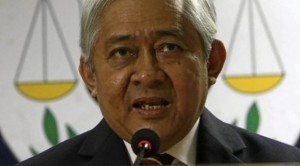MANILA, Philippines–Solicitor General Francis Jardeleza has asked the Supreme Court to compel the Judicial and Bar Council (JBC) to include his name on the list of nominees for the vacancy in the high tribunal and to temporarily stop President Aquino from filling the vacancy.
In a 14-page petition for certiorari and mandamus filed on Friday, Jardeleza also asked the court to issue, pending the resolution of the case, a temporary restraining order stopping Aquino from appointing a new justice from the short list of nominees submitted by the JBC on June 30.
The Solicitor General accused Chief Justice Ma. Lourdes Sereno and the JBC of committing grave abuse of discretion amounting to lack or excess of jurisdiction when they dropped his name from the short list without affording him his constitutional right to due process.
Malicious, unfair arrangement
He also said that Sereno had “gravely abused” her position when she acted as prosecutor, witness and judge in his case.
“This malicious and unfair arrangement, exhibited at various stages of the proceedings violates the very essence of fair play, and amounts to a violation of the Constitution,” Jardeleza said.
He said his right to due process was violated when Sereno made allegations about his integrity during the scheduled voting for the short list on June 5 and June 16. He said he was not informed about the nature and basis of the accusations and that such accusations should have been raised during the public interviews of the nominees pursuant to JBC rules.
Right to due process violated
Jardeleza said his right to due process was further violated when the JBC merely ordered him to appear before it on June 30 to inform him of the questions on his integrity.
“The filing of charges against petitioner and allowance of reasonable opportunity for him to answer said charges constitute the minimum requirements of due process. Petitioner was left with the monumental task of divining the accusations against him, an undertaking made even more difficult by the fact that the identities of his accusers were unknown. Given how little information he had, petitioner could not have been able to mount a meaningful defense,” Jardaleza said.
Excluded from shortlist
On June 30, the JBC, citing Sereno’s allegations, excluded Jardeleza from the short list submitted to President Aquino even as the Solicitor General obtained four votes, or more than half, from the seven-member screening body.
The JBC cited Rule 10, Section 2, of the JBC rules which states that in cases where the integrity of a qualified nominee is challenged, the affirmative vote of all the council members must be obtained for the favorable consideration of his nomination.
Included in the short list were Court of Appeals Justices Apolinario Bruselas and Jose Reyes Jr., who both obtained six votes; Commission on Audit Chair Gracia Pulido-Tan, five votes; and Quezon City Judge Reynaldo Daway, four votes.
Jardeleza said since he secured a sufficient number of votes, his inclusion on the short list was a mandatory and ministerial duty of the JBC.
Unlawful neglect
“Thus, the omission of petitioner in the short list amounts to an unlawful neglect by the JBC of its duty, in violation of petitioner’s right,” he said.
The Solicitor General earlier wrote the Supreme Court detailing his sentiments on the allegations against him and the conduct of the voting. The high court, however, issued a resolution stating that his letter-petition was being dismissed for being moot and academic, but adding that he may file a formal case later if he wanted to.
Lack of timely action
A minority in the high court, however, questioned the lack of timely action on Jardeleza’s letter, saying that he had raised substantial issues that could have been ruled upon by the court before the JBC conducted its final vote.
Justice Arturo Brion also expressed his doubts on the application of Rule 10, Section 2.
“If an objection comes from a council member and the objector’s positive vote is still required, then the rule is reduced to absurdity as it would mean that any member, by herself or himself, can disqualify an applicant based on his or her objection. Is this the intention of Rule 10, Section 2?” he said in a dissenting opinion backed by three other justices.
